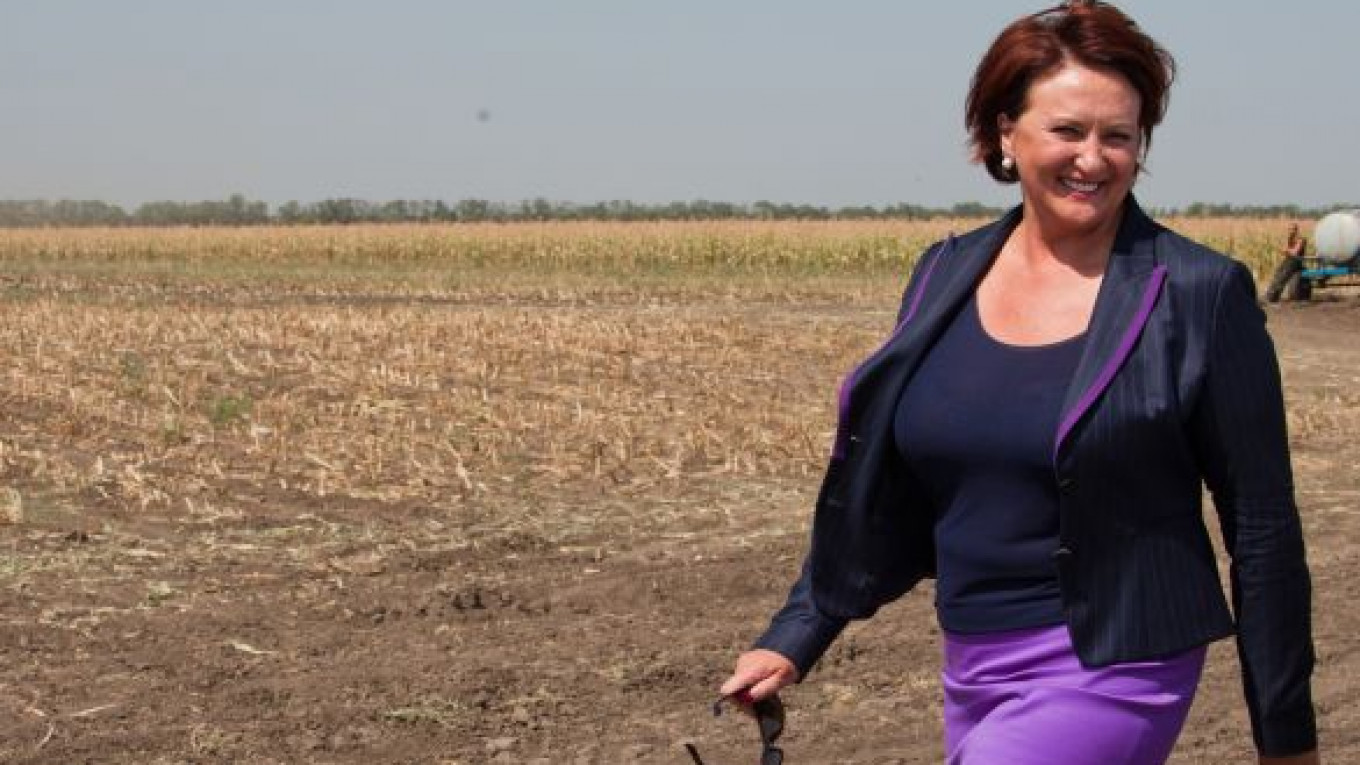The Interior Ministry on Wednesday named former Agriculture Minister Yelena Skrynnik as a witness in a criminal investigation into a $16 million fraud at the ministry.
The announcement came a day after state television aired an exposО about a fraud scheme at state-owned farm-equipment-leasing firm Rosagrolizing when Skrynnik was its head. The scheme reportedly cost the firm more than $1.2 billion.
Skrynnik immediately called the televised accusations libel, saying that the firm had an official debt of only $32,000 and that the $1.2 billion was the debt of a group of agricultural factories that leased equipment with state money.
According to investigators, three senior officials at three agricultural firms defrauded the state of 500 million rubles ($16.1 million) between 2007 and 2009 by issuing fake contracts to make it look as if they had suppled equipment to farms and factories for the money.
The officials transferred the money offshore, Interior Ministry spokesman Andrei Pilipchuk told Interfax.
One of the key suspects in the case is Oleg Donskikh, a former department head at the Agriculture Ministry and a department head at Rosagrolizing at the time of the suspected fraud.
Skrynnik served as agriculture minister between March 2009 and May 2012 and as Rosagrolizing head between 2001 and 2009.
Donskikh was placed on an international wanted list. Skrynnik is abroad, supposedly in France, Interfax reported.
The two other suspects are Sergei Burdovsky, general director of Mezhregiontorg+, and Igor Konyakhin, general director of Lipetskagrotekhservis. No suspects have been detained in the probe.
Late Tuesday, state-run Rossia-1 aired the exposО showing Yevegny Zelensky, adviser to Rosagrolizing's general director, saying state money provided to the firm had been transferred, in particular, to accounts of Britain-based company Brice Baker, which Skrynnik co-founded.
Part of the money also appeared in a Rosagrolizing account controlled by Skrynnik's brother, Leonid Novitsky, Zelensky said.
Rossia-1 also showed Rosagrolizing's first deputy general director, Lyudmila Pridanova, saying her company had filed about a thousand lawsuits seeking the return of the money. Pridanova did not say whether the lawsuits were filed against the suspects in the Interior Ministry's probe.
Skrynnik told the Komsomolskaya Pravda newspaper that according to a 2009 report by the Audit Chamber, Rosagrolizing's debt stood at 1 billion rubles, "which has now turned into 39 billion rubles, and they call it stealing for some reason."
She said the "gigantic debt" of 39 billion rubles, in her opinion, "was made purposely so that the firm could be sold as unprofitable." She did not say who could have racked up the debt.
In June, Prime Minister Dmitry Medvedev extended the deadline for the government sale of Rosagrolizing to 2016. In 2009, amid the throes of the global economic crisis, extensive privatization plans were announced to supplement revenues.
Skrynnik was replaced as chairman of the board at Rosagrolizing in early 2009 by then-Deputy Prime Minister Viktor Zubkov. She said all questions should be directed to him.
Skrynnik said she was questioned at the Investigative Committee once as part of the probe.
Meanwhile, President Vladimir Putin's spokesman, Dmitry Peskov, denied media reports that Skrynnik was Putin's aide for agricultural issues, Interfax reported.
Questions sent to Rosagrolizing's press e-mail and repeated calls to Brice Baker's general number went unanswered Wednesday afternoon.
On Nov. 13, Rossia-1, in the same series, titled "Special Correspondent," revealed corruption at the Defense Ministry under Anatoly Serdyukov.
Political analysts recently told The Moscow Times that authorities might be trying to usurp the image of corruption fighters from the opposition in a bid to win public support.
Related articles:
A Message from The Moscow Times:
Dear readers,
We are facing unprecedented challenges. Russia's Prosecutor General's Office has designated The Moscow Times as an "undesirable" organization, criminalizing our work and putting our staff at risk of prosecution. This follows our earlier unjust labeling as a "foreign agent."
These actions are direct attempts to silence independent journalism in Russia. The authorities claim our work "discredits the decisions of the Russian leadership." We see things differently: we strive to provide accurate, unbiased reporting on Russia.
We, the journalists of The Moscow Times, refuse to be silenced. But to continue our work, we need your help.
Your support, no matter how small, makes a world of difference. If you can, please support us monthly starting from just $2. It's quick to set up, and every contribution makes a significant impact.
By supporting The Moscow Times, you're defending open, independent journalism in the face of repression. Thank you for standing with us.
Remind me later.






